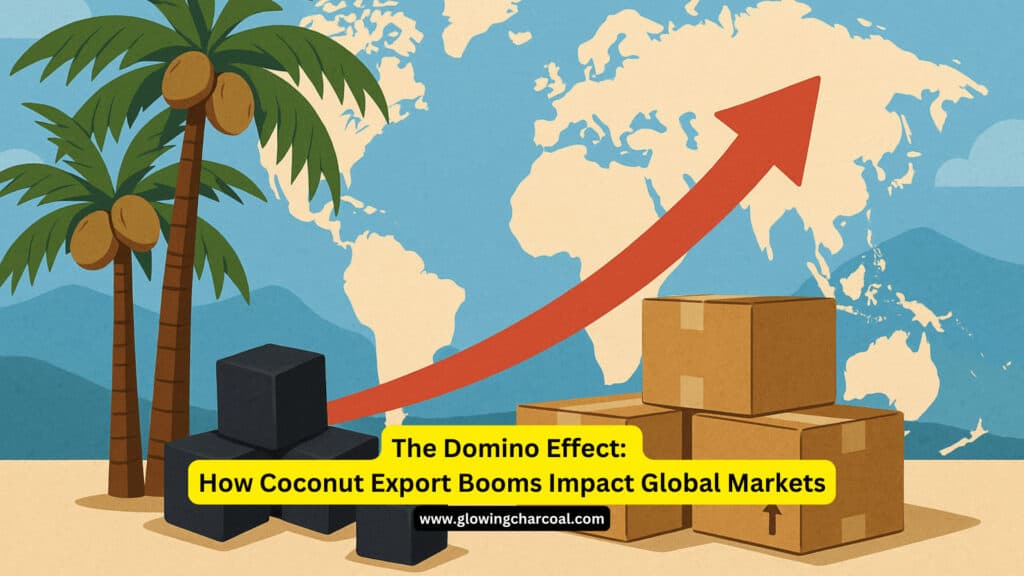The Domino Effect: How Coconut Export Booms Impact Global Markets

Over the past few years, Indonesia has seen an unprecedented surge in coconut exports—particularly to China and Thailand. While this export boom reflects the rising global demand for coconut-based products, it has also created ripple effects across the global charcoal market, especially for buyers depending on 100% coconut shell briquettes.
In this article, we explore the chain reaction caused by this booming export trade, from price inflation to raw material scarcity—and what international charcoal buyers need to know to stay ahead.
1. Skyrocketing Demand for Raw Coconut in China, Thailand, and Vietnam
China and Thailand are currently dominating the coconut import charts, driven by their food, beverage, cosmetic, and wellness industries. The appetite for coconut water, oil, milk, and derivatives is stronger than ever, pushing demand for whole coconuts to new heights.
This has shifted much of Indonesia’s coconut harvest away from the domestic charcoal industry and into raw export channels—reducing the availability of shells for carbonization.
2. Shortage of Coconut Shells in Indonesia
With more coconuts being sold whole for export, the amount of residual coconut shell (a byproduct traditionally used for charcoal) has sharply declined. This is especially challenging for premium charcoal factories that require consistent, high-density shells to produce export-grade briquettes.
Factories are now competing more fiercely for limited raw materials, pushing up prices and straining production schedules.
3. Increased Cost of Charcoal Production
As coconut shell becomes scarcer, its cost rises—and so does the cost of charcoal production. Manufacturers are now facing higher input costs for:
Raw coconut shell
Labor (to secure and transport shells from remote areas)
Energy (longer drying times due to limited shell quality)
Buyers may notice this reflected in their final per-kilo pricing, especially when ordering premium quality briquettes.
4. Supply Chain Disruptions and Delays
The scramble for coconut shells has also led to timing challenges. Factories that once guaranteed 1-2 week lead times may now need longer, especially when sourcing shells from outside their usual regions. Delays can impact:
Production timelines
Container scheduling
Buyer inventory management
Forward planning is now more crucial than ever.
5. Shifting Power Dynamics in the Market
Buyers who previously had the upper hand in negotiations are now adjusting to a more competitive market. The boom in coconut exports has made quality suppliers more selective, and long-term relationships with committed partners are being prioritized over one-time transactions.
As a result, buyers who show consistency, volume stability, and transparent collaboration will be the ones securing priority production slots.
6. What Can Buyers Do?
Here’s how importers can navigate the impact of the export boom:
Forecast ahead: Place orders earlier and in larger, consolidated volumes
Partner long-term: Build loyalty with reliable Indonesian factories
Stay informed: Monitor coconut industry trends and regional supply shifts
Evaluate quality controls: Ensure your supplier is maintaining standards despite the shortage
Final Thoughts
The boom in coconut exports is good news for Indonesia’s economy—but it comes with trade-offs. For the charcoal industry, it means tighter supply, rising costs, and shifting dynamics.
Buyers who recognize these challenges early and adapt their sourcing strategy will be in the best position to maintain consistent, high-quality supply through 2025 and beyond.
Want to protect your charcoal supply chain from the domino effect? Let’s talk.
Looking for trusted and reliable coconut charcoal briquettes factory?
WhatsApp: +62-812-8400-6660
E-mail: info@glowingcharcoal.com
